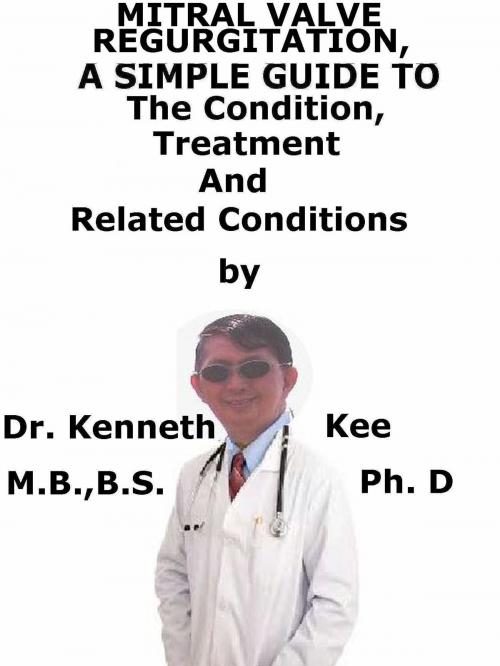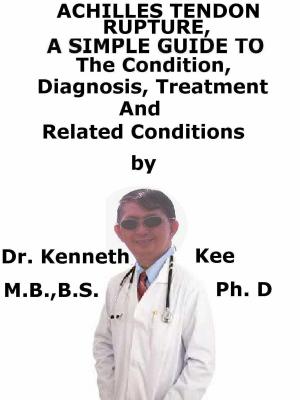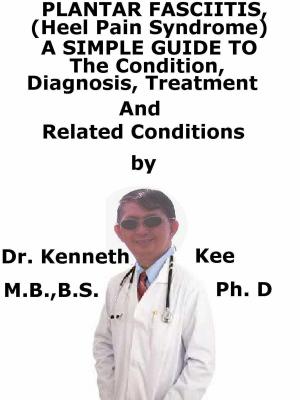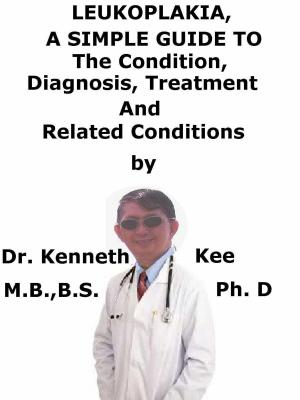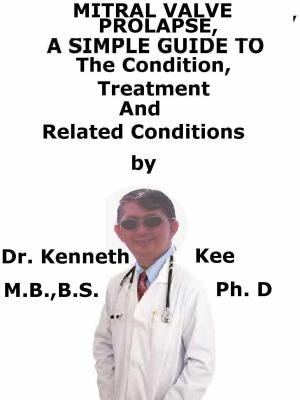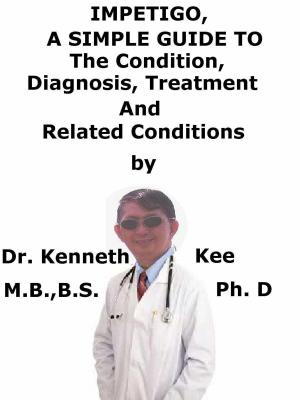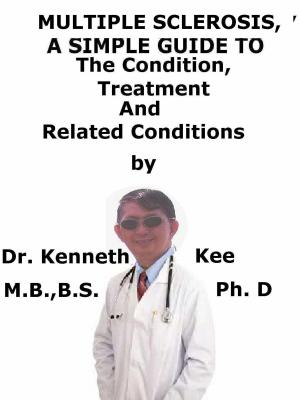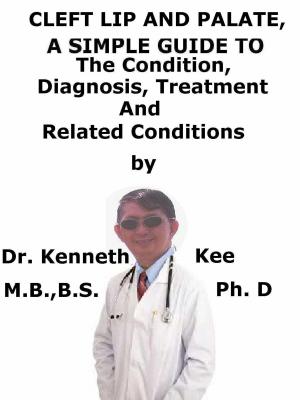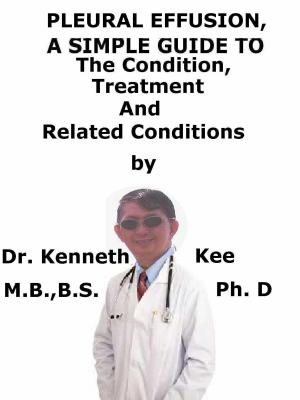Mitral Valve Regurgitation, A Simple Guide To The Condition, Treatment And Related Conditions
Nonfiction, Health & Well Being, Medical, Specialties, Internal Medicine, Cardiology, Health, Ailments & Diseases, Heart| Author: | Kenneth Kee | ISBN: | 9781370594788 |
| Publisher: | Kenneth Kee | Publication: | January 10, 2017 |
| Imprint: | Smashwords Edition | Language: | English |
| Author: | Kenneth Kee |
| ISBN: | 9781370594788 |
| Publisher: | Kenneth Kee |
| Publication: | January 10, 2017 |
| Imprint: | Smashwords Edition |
| Language: | English |
Mitral regurgitation is a medical condition in which the heart valve that separates the upper and lower chambers on the left side of the heart does not close properly.
Regurgitation means leaking from a valve that does not close all the way.
Mitral regurgitation is the most common type of heart valve disorder.
As the valve does not close properly, some blood is pumped back into the left atrium when the left ventricle contracts
Therefore the wall of the atrium may become thicker (hypertrophy) and the atrium may enlarge
This leads to a decrease in blood flow to the rest of the body.
As a result, the heart may try to pump harder.
Causes are:
1. Coronary heart disease and high blood pressure
2. Infection of the heart valves
3. Mitral valve prolapse (MVP
4. Use of fenfluramine or dexfenfluramine for 4 or more months.
When symptoms occur, they often develop gradually, and may include:
1. Cough
2. Fatigue, exhaustion, and light-headedness
3. Rapid breathing
4. Sensation of feeling the heart beat (palpitations) or a rapid heartbeat
Diagnosis is by:
Extra heart sound (S4 gallop)
Apical soft pan-systolic murmur
Echocardiogram shows the mitral regurgitation
ECG and CXR show a normal heart if mild but left ventricle enlargement in later MR.
Patients with high blood pressure or a weakened heart muscle may be given medications to reduce the strain on the heart and help improve the condition.
1. Beta-blockers or ACE inhibitors
2. Blood thinners (anticoagulants) to help prevent blood clots in people with atrial fibrillation
3. Drugs that help control uneven or abnormal heartbeats
4. Water pills (diuretics) to remove excess fluid in the lungs
5. A low-sodium diet may be helpful
Surgical repair or replacement of the valve is recommended if:
1. The heart function is poor,
2. The heart becomes larger (dilated)
3. Symptoms become more severe
TABLE OF CONTENT
Introduction
Chapter 1 Mitral Regurgitation
Chapter 2 More about Mitral Regurgitation
Chapter 3 Treatment of Mitral Regurgitation
Chapter 4 Heart Valve Diseases
Chapter 5 Mitral Stenosis
Chapter 6 Aortic Regurgitation
Chapter 7 Tricuspid Regurgitation
Chapter 8 Pulmonary Regurgitation
Epilogue
Mitral Valve regurgitation is a rare congenital valve disease
Where the mitral valves do not close tightly and may release
Blood may leak from the ventricle back into the atrium
This may cause strain on the left atrial myocardium
Mitral regurgitation is the most common type of heart valve disorder
Blood flows backward into the atrium from the lower chamber
Therefore the wall of the atrium may become thicker
As a result the heart may need to pump harder
The mitral valve makes an apical systolic murmur, a whooshing sound
When the valve leaks back into the left atrium a small amount
The stretched flaps can make an extra sound (S4) as they shut.
The echocardiogram show the valve movement in the heart
Treatment is to reduce the heart's workload by medications
Beta blockers may be used to treat chest discomfort or palpitations
Blood-thinning medicines reduce the risk of blood clots forming
Surgery is needed if the abnormal mitral valve allows the blood backflowing
-An original poem by Kenneth Kee
Mitral regurgitation is a medical condition in which the heart valve that separates the upper and lower chambers on the left side of the heart does not close properly.
Regurgitation means leaking from a valve that does not close all the way.
Mitral regurgitation is the most common type of heart valve disorder.
As the valve does not close properly, some blood is pumped back into the left atrium when the left ventricle contracts
Therefore the wall of the atrium may become thicker (hypertrophy) and the atrium may enlarge
This leads to a decrease in blood flow to the rest of the body.
As a result, the heart may try to pump harder.
Causes are:
1. Coronary heart disease and high blood pressure
2. Infection of the heart valves
3. Mitral valve prolapse (MVP
4. Use of fenfluramine or dexfenfluramine for 4 or more months.
When symptoms occur, they often develop gradually, and may include:
1. Cough
2. Fatigue, exhaustion, and light-headedness
3. Rapid breathing
4. Sensation of feeling the heart beat (palpitations) or a rapid heartbeat
Diagnosis is by:
Extra heart sound (S4 gallop)
Apical soft pan-systolic murmur
Echocardiogram shows the mitral regurgitation
ECG and CXR show a normal heart if mild but left ventricle enlargement in later MR.
Patients with high blood pressure or a weakened heart muscle may be given medications to reduce the strain on the heart and help improve the condition.
1. Beta-blockers or ACE inhibitors
2. Blood thinners (anticoagulants) to help prevent blood clots in people with atrial fibrillation
3. Drugs that help control uneven or abnormal heartbeats
4. Water pills (diuretics) to remove excess fluid in the lungs
5. A low-sodium diet may be helpful
Surgical repair or replacement of the valve is recommended if:
1. The heart function is poor,
2. The heart becomes larger (dilated)
3. Symptoms become more severe
TABLE OF CONTENT
Introduction
Chapter 1 Mitral Regurgitation
Chapter 2 More about Mitral Regurgitation
Chapter 3 Treatment of Mitral Regurgitation
Chapter 4 Heart Valve Diseases
Chapter 5 Mitral Stenosis
Chapter 6 Aortic Regurgitation
Chapter 7 Tricuspid Regurgitation
Chapter 8 Pulmonary Regurgitation
Epilogue
Mitral Valve regurgitation is a rare congenital valve disease
Where the mitral valves do not close tightly and may release
Blood may leak from the ventricle back into the atrium
This may cause strain on the left atrial myocardium
Mitral regurgitation is the most common type of heart valve disorder
Blood flows backward into the atrium from the lower chamber
Therefore the wall of the atrium may become thicker
As a result the heart may need to pump harder
The mitral valve makes an apical systolic murmur, a whooshing sound
When the valve leaks back into the left atrium a small amount
The stretched flaps can make an extra sound (S4) as they shut.
The echocardiogram show the valve movement in the heart
Treatment is to reduce the heart's workload by medications
Beta blockers may be used to treat chest discomfort or palpitations
Blood-thinning medicines reduce the risk of blood clots forming
Surgery is needed if the abnormal mitral valve allows the blood backflowing
-An original poem by Kenneth Kee
